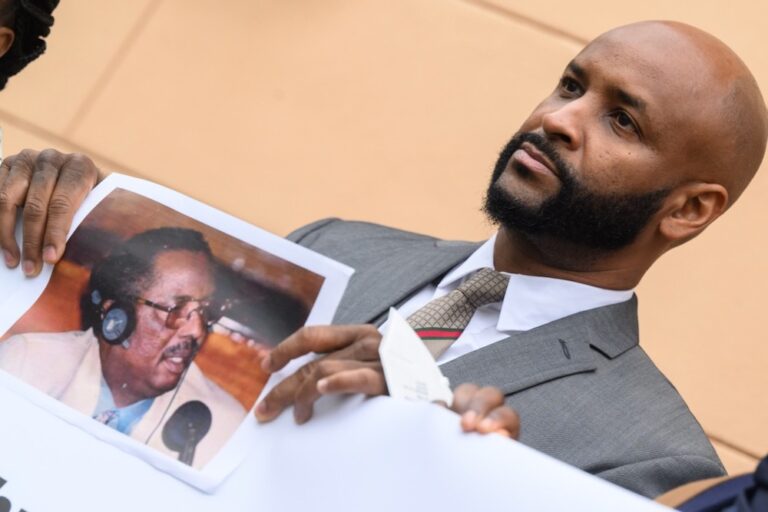(ARTICLE 19/IFEX) – The following is an ARTICLE 19 press release: **For background information, see IFEX alerts of 19 May, 20 April, 3 March, 19 February, 13 February and 9 February 1998** London, Johannesburg and Banjul: 17 June 1999 THE GAMBIA: INTERNATIONAL RIGHTS GROUP CRITICISES GOVERNMENT MEDIA CONTROL, FOOTDRAGGING ON RADIO CENSORSHIP CASE As the […]
(ARTICLE 19/IFEX) – The following is an ARTICLE 19 press release:
**For background information, see IFEX alerts of 19 May, 20 April, 3 March,
19 February, 13 February and 9 February 1998**
London, Johannesburg and Banjul: 17 June 1999
THE GAMBIA:
INTERNATIONAL RIGHTS GROUP CRITICISES GOVERNMENT MEDIA CONTROL, FOOTDRAGGING
ON RADIO CENSORSHIP CASE
As the legal case which has silenced Citizen FM radio enters its seventeenth
month, international human rights group ARTICLE 19 today condemned the
Gambian government’s continuing harassment of the independent media, and
released a new report raising serious concerns about the continuing threat
to freedom of expression in The Gambia.
In Freedom of expression still under threat – the case of Citizen FM,
ARTICLE 19 also makes public its concerns, first communicated in May 1999 to
the Gambian government, that its draft National Communication and
Information Policy (NACIP) is in danger of failing to meet The Gambia’s
international human rights obligations.
Rotimi Sankore, a consultant to the Africa Programme of ARTICLE 19, said at
a press conference in The Gambia today at the end of the annual convention
of the West African Journalists Association:
“ARTICLE 19 believes that the government is unfairly targeting Citizen FM
not only for its independent-minded editorial line, but also for having
broadcast news programmes in indigenous languages.”
Andrew Puddephatt, Executive Director of ARTICLE 19, added from London:
“ARTICLE 19 calls upon the Gambian government to use our Memorandum of 13
May 1999 as a checklist to measure how far the proposed NACIP meets the
international human rights obligations of The Gambia.”
Since February 1998, the premises of Citizen FM have been sealed and it has
been prevented from broadcasting because its programmes were considered
“destructive and inflammatory”. Baboucar Gaye, its proprietor, is currently
appealing against a fine imposed for operating a radio station without a
licence. No other stations have been singled out for such treatment.
In April 1999, the government’s lawyers failed to turn up at the first
appeal hearing against the conviction, ensuring that the case had to be
postponed and the station kept off air.
In its new report, ARTICLE 19 provides details of the case of Citizen FM and
shows that is not the only example of government efforts to harass and
silence the independent media. There have been persistent attacks on The
Gambia’s largest selling independent daily newspaper, the Observer,
including deportation of two of the paper’s editors. ARTICLE 19 expresses
concern about the recent sale of the newspaper to a businessman believed to
be close to the government.
The report also gives a detailed account of how recent drafts of the NACIP
fall short of The Gambia’s international obligations on freedom of
expression in key areas such as public broadcasting, regulation of the print
media and the licensing process for private broadcasting. ARTICLE 19 argues
that if the NACIP is to be credible, it must be accompanied by the amendment
or repeal of key repressive military decrees and other laws which violate
freedom of expression.
Notes for Editors:
1. The report makes public for the first time ARTICLE 19’s Memorandum to the
Government of The Gambia on the National Communication and Information
Policy (NACIP) of May 1999


